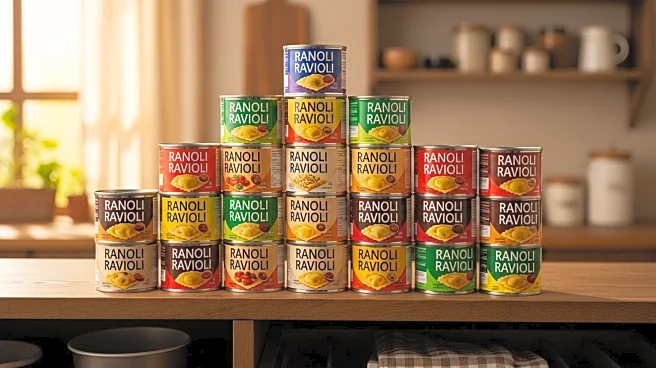What's Happening?
Germany is taking steps to prepare for potential future conflicts, particularly in light of Russian aggression. The German government aims to be 'kriegstüchtig' or fit for war by 2029, anticipating possible threats from Russia. As part of this preparation, Germany's Agriculture and Food Minister, Alois Rainer, has proposed the creation of a national reserve of ready-to-eat meals, including canned ravioli and lentils. This initiative is part of a broader strategy to overhaul national stockpiles, traditionally consisting of unprocessed staples, to ensure food security during crises. The proposal, estimated to cost up to $105 million, would involve major food chains managing logistics and storage. Rainer emphasizes the importance of food security alongside military preparedness, citing potential crises such as natural disasters or nuclear accidents.
Why It's Important?
The proposal for a national ravioli reserve highlights the evolving security landscape in Europe, where food security is increasingly seen as integral to national defense strategies. This initiative reflects a shift in Germany's traditionally pacifist stance, driven by the perceived threat from Russia and concerns about the reliability of U.S. support in a European conflict. The focus on ready-to-eat meals underscores the need for rapid response capabilities in emergencies, whether military or civilian. The plan also signals a broader societal shift towards preparedness, influenced by recent experiences such as the COVID-19 pandemic, which exposed vulnerabilities in supply chains and emergency readiness.
What's Next?
Germany's proposal for a national ravioli reserve may face logistical and financial challenges, including the need for regular replenishment due to limited shelf life. The initiative is part of a larger effort to expand civil protection measures, including increasing the number of shelters available to the population. Germany's Federal Office of Civil Protection and Disaster Assistance is working on repurposing existing structures like subway stations and basements into shelters. The proposal may also prompt other European countries to reassess their own emergency preparedness strategies, potentially leading to increased collaboration on civil protection measures.
Beyond the Headlines
The proposal for a national ravioli reserve raises questions about the balance between military and civilian preparedness in national security strategies. It highlights the importance of comprehensive planning that includes food security, civil protection, and public awareness. The initiative may also influence cultural perceptions of preparedness, shifting attitudes towards stockpiling and emergency readiness. As Germany navigates these changes, the proposal could serve as a model for other nations facing similar security challenges.










